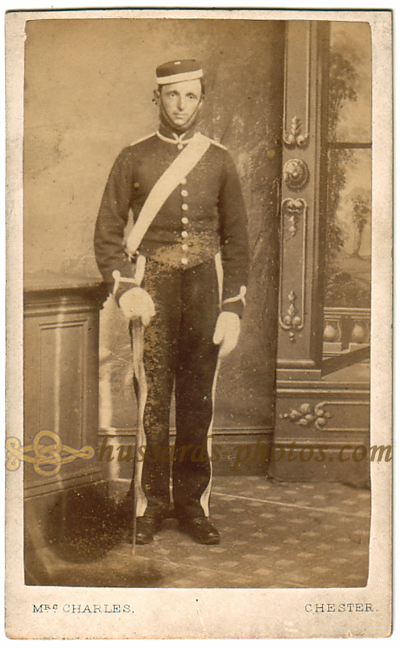
United Kingdom

|
Carte
de Visite, studio Mrs Charles, Brook Street, Chester. |
|
|
|
We learn about the uniform specifics through "The Earl of Chester's Regiment of Yeomanry Cavalry: its formation and services, 1797-1897" (Frederick Leary, Ballantine Press, 1898) The Light Dragoon shako had been changed to the Hussar busby in 1863. In 1865, the muster rolls listed 37
Officiers, 40 NCOs and 560 Other Ranks. In 1871, according to the War Office circular dated April 11, 1870, Regimental Orders were issued and the regiment was reduced to 8 troops - disbanding the Altrincham and Toft troops. It is notable that no troop was established in Chester itself - though Chester Castle served to store the spare Arms &c., and that is where the regiment assembled yearly for permanent duty. The headquarters of the regiment were also removed from Knutsford to Chester in 1874. There seems to be some story behind the Photographer's studio, as hinted through The Law times in 1868 : "CHESTER COUNTY COURT. This was a striking instance of the
good effect of the 10th section of the County Courts Amendment Act of
last session, discouraging experimental actions by men of straw and
venturesome attorneys. The plaintiff, Mr. John Charles, is a photographer, of Birmingham, and formerly occupied a house and premises in Brook-street, Chester, under the defendant, Mr. William Bertram, a dealer in iron, of Chester. It appeared from the statement of plaintiffs attorney that while a tenant under his former landlord, Mr. Dewsbury, the plaintiff fitted up the premises at a considerable cost to carry on his business as a photographer, but to mar his prospects his wife became enamoured of the operator, and eloped with him. It was some years after he had fitted up his studio that Mr. Dewsbury sold the premises by auction, and they were bought by the present defendant, who let them to the plaintiff at a weekly rent of 8s.. which commenced in August 1867, for a year certain. The plaintiff having found it necessary for him to have another helpmeet, advertised for a housekeeper, and was accommodated in the person of Elizabeth Gillian, for whom he afterwards entertained a stronger affection than a master generally does for a servant. Before the year of his tenancy had expired he left the town to seek employment, and before going gave to Miss Gillian the charge of the house and premises. There was 24s. owing for rent, and besides the fact that plaintiffs creditors were pressing him, it seems that he had given a bill of sale to Mr. J. Duckers. In his absence, however, the defendant entered the house, as was alleged, without any justification whatever, took possession of everything, and while proceeding in this summary manner locked up the housekeeper, Miss Gillian, who had been persistent enough to declare she was mistress of the house. After keeping her a prisoner for some time he released her, and then bad the doors and windows nailed up. The furniture and photographic apparatus were sold by auction by Mr. Hodgkinson, and realised at a forced sale 25l., and the defendant was held by plaintiff to be liable for thus converting his property. The real wife is now in possession instead of the concubine, and the money is still in the hands of the auctioneer. The plaintiff was examined as to
the facts, and in cross-examination, admitted that he went away because
he could not pay the people. He left the house as compensation to Elizabeth
Gillian, whom he considered he had wronged. He did write a letter to
her telling her that when she received it he would be 300 miles away
with his brother, as he could not think of coming back to Chester to
stay if Mrs. Charles were there. Could not say what he meant by that
Miss Gillian was still in Birmingham with him. His Honour, in summing up, pointed
out to the jury that as the house was in the occupation of the plaintiff's
wife, which in the eye of the law, is his own occupation, and in pretty
nearly the same condition as when first entered by the defendant, the
plaintiff could not have received any serious damage, and that if the
plaintiff went away without intending to return, giving the place over
to Miss Gillian, he would be entitled to no damages at all, as in that
case she would be the party aggrieved. It seems from the local directories that John Charles worked his studio at 3, Brook Street, between 1860 and 1868, and that Mrs. Hannah Charles operated at 8, Brook Street, around 1870 to 1874. |